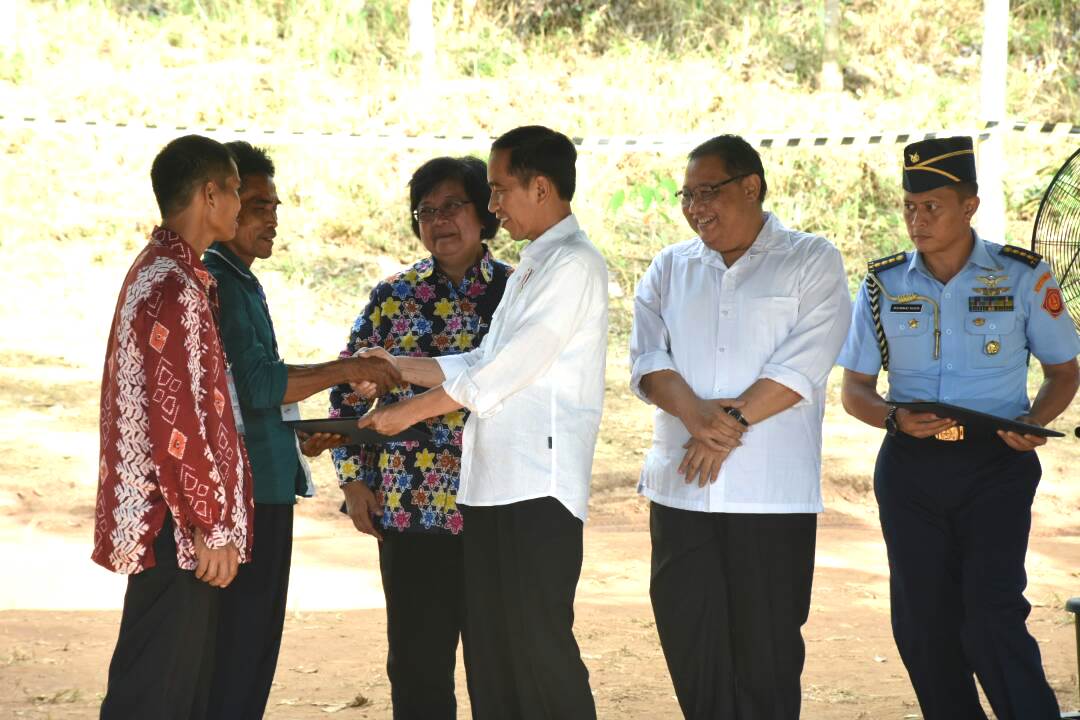Indonesian President visits W-BRIDGE project site
Mon, May 22, 2017-
Tags
Advancing cooperative partnership for the environment
On May 17, President Joko Widodo of Indonesia visited a W-BRIDGE project site in South Kalimantan and officially approved the use of state-owned land by local residents to grow rubber trees, which will turn degraded grassland into forests and improve the standard of living for the local community.

President Widodo (center)
To fulfill the social responsibility of mitigating environmental issues, Waseda University and Bridgestone Corporation started the Waseda-Bridgestone Initiative for Development of Global Environment (W-BRIDGE) in 2008. W-BRIDGE takes the conventional academia-industry cooperation a step further and encourages the participation of local residents, supporting practical research and activities to bridge the three parties (academia, industry, and the community).
W-BRIDGE has supported the project “Expanding the Area of and Bolstering Community Organizations in a Model for Rehabilitating Forests through Community Participation Using Rubber Trees in State Forests (Forest Reserves),” which is recognized by the Ministry of Environment and Forestry of Indonesia as a successful example of the community forestry system promoted by the Indonesian government. Followed by the Minister of Environment and Forestry’s visit in September 2016, President Widodo visited the site and highly praised the project. He then handed the official document of approval to the community group leader who has been involved with the project from the start. Further support is being considered for participating residents in the future, with anticipations to expand the project throughout the entire country.
President Widodo graduated from the Faculty of Forestry at Indonesia’s prestigious Gadjah Mada University and is an expert forestry management and conservation. This visit by the President has earned the project high reputation, and is expected to progress forestry management policies in Indonesia, as well as cooperative partnership for the environment with Japan.
About the W-BRIDGE Project
W-BRIDGE has carried out various studies and projects within and outside of Japan, supporting a total of 130 environmental organizations and universities in the last 10 years. In Indonesia, the project “Expanding the Area of and Bolstering Community Organizations in a Model for Rehabilitating Forests through Community Participation Using Rubber Trees in State forests (Forest Reserves)” was implemented in Tanah Laut Regency, South Kalimantan in 2012. Led by Waseda University’s Professor of Emeritus Yasushi Morikawa, the project is run in collaboration with Japan International Forestry Promotion and Cooperation Center (JIFPRO), Lambung Mangkurat University, and Bridgestone Kalimantan Plantation (BSKP).
Indonesia has the world’s third largest land area of rainforests and is home to many endangered species. On the other hand, preventing deforestation and degradation due to forest fires and illegal logging, in addition to improving the standard of living for local residents, are recognized as urgent issues. The Indonesian government ended its top-down approach in forest management and officially started the community forestry system, which recognizes the rights of local residents to use state-owned land, in 2015. Under this system, local residents form groups to use national land and manage the forests. This is a landmark policy, considering that the Indonesian government has granted permission to use such land mainly for large businesses only.
As part of the community forestry system, a local resident group of approximately 60 households obtained official approval to use state-owned land to cultivate rubber trees in 57ha. W-BRIDGE helped cover the initial costs (fertilizer, labor costs, etc.), and BSKP donated high-quality rubber tree seedlings and trained local residents with cultivation techniques. Furthermore, Lambung Mangkurat University led facilitation efforts, such as teaching community organization management, and increased environmental awareness among local residents as well as empowered the community to become self-reliant.
The project is praised for its success in obtaining sustainability. The community was able to collect sap from rubber trees within the last year, which means that the residents will no longer have to rely on unstable income as day laborers. The local residents cultivating rubber trees will eventually lead to preventing forest fires, even in surrounding forests, and dramatically improve biodiversity. In addition to rubber trees, afforestation efforts to plant fruit species (coffee and mango trees) and nectar plants producing honey are being implemented, taking multiple approaches to stabilize and improve the life of community members.
This W-BRIDGE project is expected to draw significant attention on “Reducing Emissions from Deforestation and forest Degradation (REDD+),” an international conservation plan by Japanese businesses to reduce greenhouse gas, and carbon-credit trading such as Joint Credit Mechanism (JCM), potentially becoming a great case study of corporate social responsibility initiatives by Japanese businesses.











